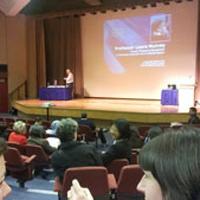Film and Media 2013 conference in London
2013 / 07 / 01
The Third Annual London Film and Media Conference took place at the University of London on 27-29 of June, 2013. The theme of this year was The Pleasures of the Spectacle. The Director of the Academic Conferences of London Phillip Drummond has called the participants to “explore, celebrate and critique the many delights of film and media, and the fascinating issues which these entail for academic research, and also discussion in the wider society.”
The conference has gathered as many as 230 emerging and established scholars from some 40 nations,who gathered for what would be again the largest ‘home-grown’ UK event in the field.
Here below is more information about the concept of the conference:
The arrival of the cinema in the final decade of the 19th Century marked the completion of a quest for extended visual representation in motion, with all its attendant revelations of the modern world. Within just over three decades, synchronised sound had provided a further amplification, opening up the twin channels of the audio-visual.
The new medium offered the generalised pleasures of looking and hearing, but in emphatic terms – concentrated attention focussing on the high intensities of the cinema screen. It stressed visuality and audibility under conditions of increasing narrative rigour, and mounting spectacle. A further pleasure was entailed – membership of social audiences, entertained in the great movie palaces of the 20th Century.
These pleasures sometimes arose from the medium’s engagement with the real, sometimes from its fantastical departures from the everyday. They offered various forms of psychic release (as in comedy), sometimes reinforced powerful human drives (such as the sexual). Sometimes, perversely, their delights arose from their involvement of the spectator in apparently unpleasurable experiences of fear and dread (as in horror).
From the mid-20th Century onwards, the new medium of Television shifted the focus of pleasure from the social arena of the movie theatre to the domestic space of the home, and from the endless circulation of individual film texts to the pleasurable ‘flow’ of broadcasting, with its broad generic mix of audio-visual messages and its more diffuse manipulation of the audio-visual.
New media dramatically extended the range, in particular by loosening up the manipulation of sound and image – and providing consumers with the pleasures of a higher degree of control – and by ‘personalising’ media experience more directly. The power of digital media demonstrates just how far the audio-visual has come since its early fascination with the pleasures of the ‘real’, now offering both mundane and extreme forms of illusion and delight.
FILM AND MEDIA 2013 will consider the many ways in which the spectacle has been constructed, and in which the spectacle afforded by film and media creates varieties of pleasure for audiences and spectators. These will range from the basic forms of pleasurability involved in looking at, and listening to, audio-visual messages through to the complex psychic regimes involved in these processes, the social nature of the practices of viewing and listening, and the broader politics of pleasure where sound and vision are concerned.
Titas Petrikis has presented his on-going PhD research “The creating of the New Sound World for Dracula (Browning, 1931)” for a wider academic audience for the first time. The study concerns the convergence in film sound and music, as well as using the soundtrack to imply an expanded, contextual meaning in addition to the film. His paper explores the potential convergence of film sound and music created in the multi-channel composition of Dracula (Tod Browning, 1931). The film is screened in the context of an audiovisual installation in which one element of the artefact is the restored original film soundtrack. The research includes the technical restoration of the original dialogue and the composition of a new soundtrack in mono relevant to the horror genre. This soundtrack has then been used as an element of a larger multi-channel composition, which liberates itself from the film’s plot and, with a new philosophical concept, creates a dialectic meaning. The new soundtrack includes modified, synthesized samples from the original soundtrack as well as quotes from Stoker’s Dracula; references to the sounds of the time period (Nazi rallies, warfare, prosecution), the original recordings of Transylvania, and the Requiem genre. This paper discusses the creative practice in the context of the theoretical implication of the composition.
MORE INFORMATION IN THE INTERNET: